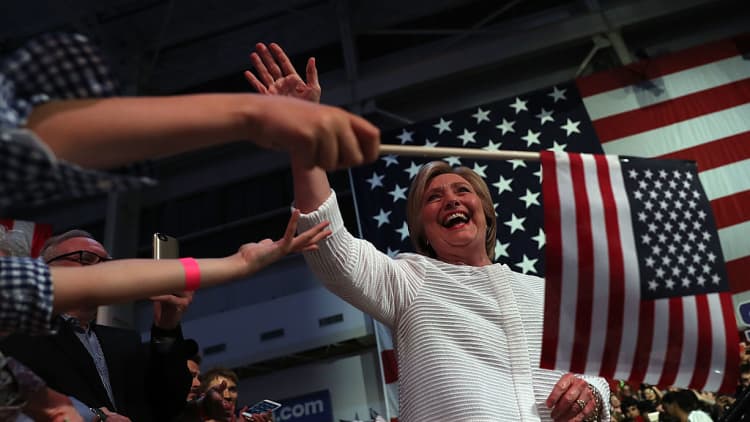
Hillary Clinton staggered but never fell during the Democratic primaries. And now her history-making campaign is off and running ahead of Donald Trump with five months until the general election.
She had made Democrats nervous. The strength of Bernie Sanders' long-shot challenge, for a time, cast unexpected doubt on her bid to make history by becoming the first woman presidential nominee of a major party. The fervent enthusiasm he generated, especially among young and independent voters, underscored misgivings with the party about her stolid, cautious style and the quarter-century of political baggage she brought to her second White House race.
Meanwhile, Democrats fretted over polls showing Trump running even with Clinton after he locked up the Republican nomination and began consolidating support among his party's rank and file. His unorthodox nationalist campaign that scrambled conventional calculations held the promise of capturing a pessimistic electorate's desire for change after eight years of a Democratic president.
Yet the final chapter of primary competition has unfolded far better than Clinton could have hoped even just a few weeks ago.
Tuesday's primary results firmly and conclusively extinguished any lingering hopes for the Sanders campaign. Clinton won four of six contests. In the largest prize of California, where Sanders had tried for two weeks straight to re-energize his "political revolution," she routed him by a double-digit margin. Notwithstanding his contention that the Democratic primary process had been stacked against him, the self-styled Democratic socialist lost by every measurement: votes, states, pledged delegates, super-delegates.
She claimed the nomination on Tuesday night in speech with an understated, conversational style that maximized her strengths. She celebrated finally shattering the glass ceiling she failed to break through against Barack Obama in 2008. And she offered a unifying contrast to Trump's sharp edges, calling Americans "stronger together." Targeting his signature immigration proposal, she added, "bridges are better than walls."
And as she finished Sanders off, Trump energetically damaged himself. Last week, Clinton broke through his domination of the headlines with a forceful speech asserting that he is temperamentally unfit to serve as president. He failed to effectively rebut it.
In addition, his remarks invoking the "Mexican heritage" of a judge presiding over the lawsuit challenging Trump University as a fraud prompted sharp denunciations within his own party. It rarely gets worse for a presidential nominee than to have a House speaker of his own party denounce his remarks as "racist," as Speaker Paul Ryan did Tuesday. An incumbent Republican senator facing a difficult re-election battle — Mark Kirk of Illinois — announced his opposition to Trump on precisely the same fitness grounds Clinton had argued.
Throughout the GOP, strategists shuddered over the impact of the bombastic billionaire's behavior on the two groups of voters the party most needs to compete nationally again — Latinos and women. Democrats savored the spectacle, anticipating a well-timed bump in the polls for Clinton that would widen her modest lead in polling average.
"General election voters are just beginning to pay attention to the kind of president Trump would be," said Democratic pollster Geoff Garin. "This is very much a definitional period for him."
That has made this a better-than-expected launch for Clinton's general election campaign, with Obama's formal endorsement expected soon.


